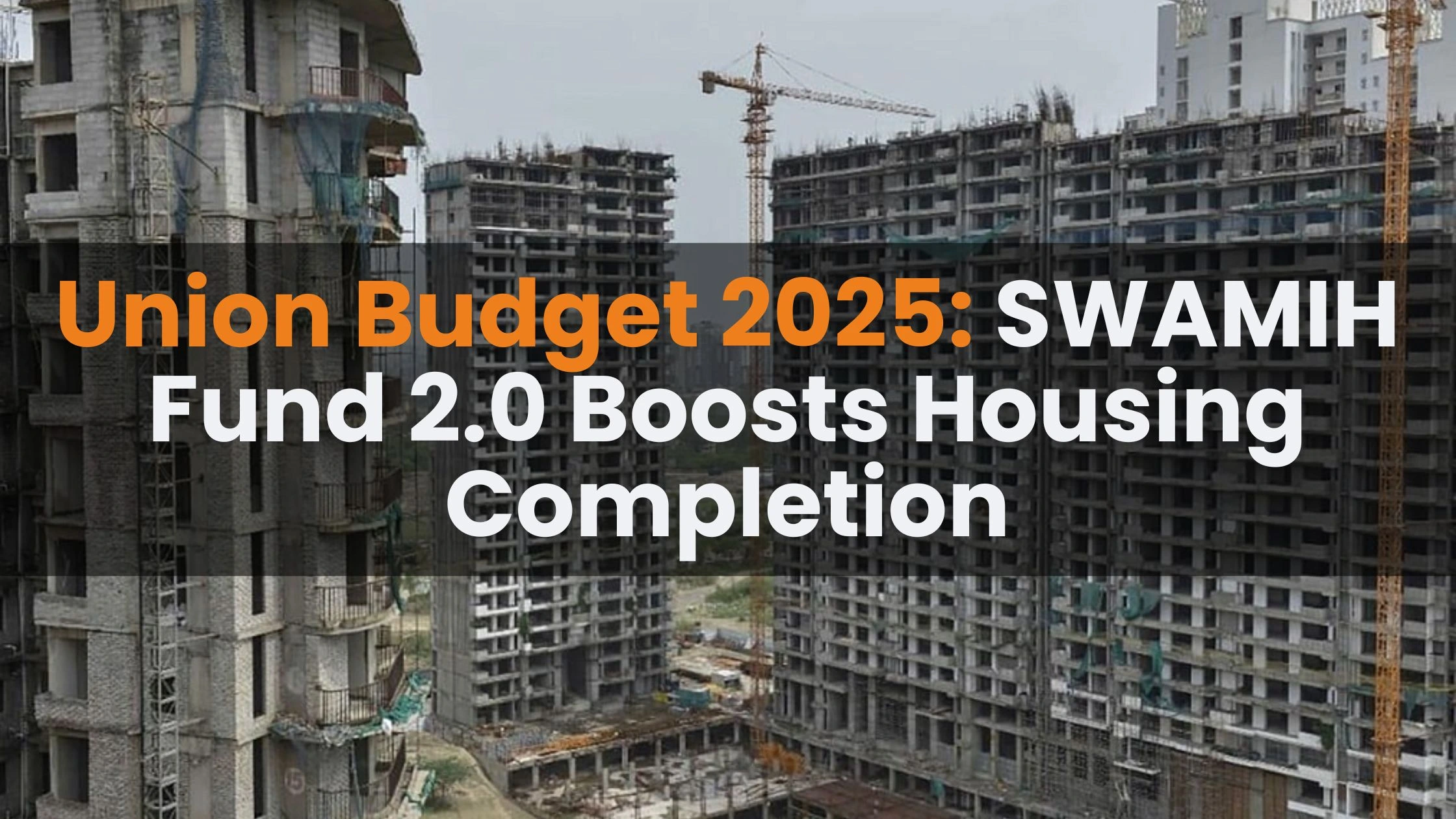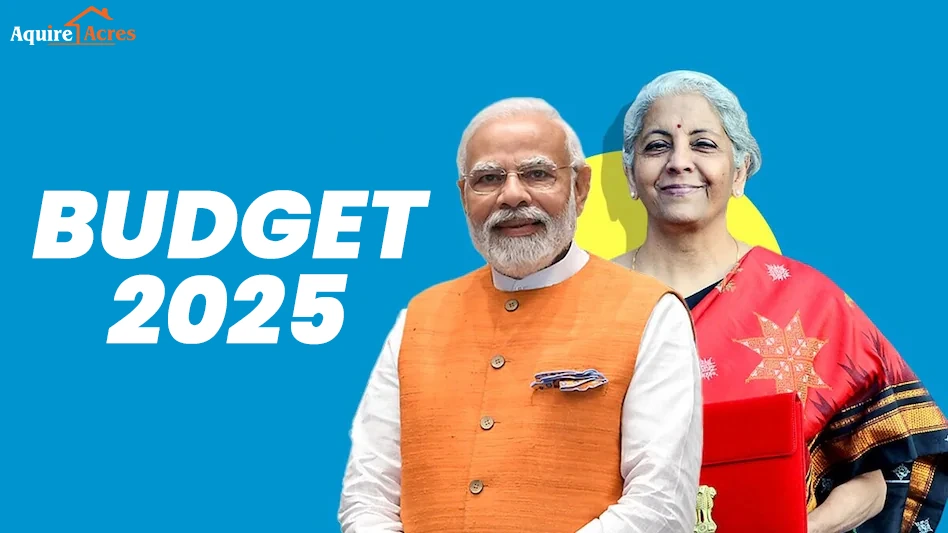Table of Content
▲
The real estate sector plays an important role in India's economic growth. Experts are eagerly awaiting the Union Budget 2025. It is hoped that Finance Minister Nirmala Sitharaman will announce measures that can further promote the sector. Real estate developers, home buyers and even industry experts have their wish lists for the upcoming budget.
This includes various reforms. That may improve housing affordability. Ease of doing business and the overall health of the market Let's explore what everyone can expect in the upcoming budget.
Easing the GST Burden and Other Key Expectations
The Indian real estate market is set to witness impressive growth in 2024, especially in the luxury home segment. As the economy recovers and people start investing in their homes again, The real estate sector is looking at beneficial measures from the Budget to continue this momentum.
Sudeep Bhatt, Director of Strategy, Whiteland Corporation, believes that the Budget may bring about changes that will help the real estate sector continue to grow. One of the main demands is to reduce the Goods and Services Tax (GST) burden on developers. Developers are facing challenges due to high taxes on properties under construction. And a drop in GST rates could make it easier for them to build and sell homes.
Another key expectation is the resurgence of the Credit Linked Subsidy Scheme (CLSS) to assist first-time homebuyers. This program provides subsidies to people from low income groups. This makes homeownership more affordable. In addition, increasing the interest deduction limit for home loans could spur housing demand by providing better tax benefits to homebuyers.
Experts also hope that the government will introduce policies that will encourage private and foreign investment. Especially through relaxed foreign direct investment (FDI) norms, the introduction of such measures will bring more money into the market. and accelerate further growth.
Also Read: India's Housing Market Faces Slowdown, Eyes Budget 2025 for Revival
Balancing the Needs of Developers and Buyers
Keerthi Chilukuri, Stonecraft Group founder and MD, expects the government to take a balanced approach. This will benefit both developers and buyers. By treating real estate as a key industry Governments can provide easier access to appropriate funding. Expedite approval and attract more investment.
Reducing the GST burden on developers and revitalizing CLSS will help stabilize property prices and make home ownership more affordable. Additionally, liquidity will be improved with amendments to mortgage interest relief and a review of capital gains tax, making it easier for everyone to participate in the market. This can create sustainable and livable cities while achieving the country's environmental and economic goals.
Focusing on Infrastructure and Smart Urban Projects
Ashish Bhutani, CEO of Bhutani Infra, believes that the budget can help improve the commercial real estate sector by bringing in a single window clearance system. This will speed up project approval, save time and reduce delays. It can also position India as a major trade hub by creating an enabling environment for foreign investors to invest in office space and commercial buildings.
Tax breaks for green buildings and smart city projects will help attract foreign investors. This will help promote this sector further. With the right support Real estate can play a key role in creating jobs and supporting India's vision of building a $5 trillion economy.
Boosting Real Estate in Tier-II Cities
Yashank Wason, Managing Director of Royal Green Realty, sees the Union Budget 2025 as a chance to boost the real estate sector, especially in Tier-II cities. Cities like Indore, Bahadurgarh, and Sonipat are becoming engines of economic development, and there is a need for policies that promote housing, infrastructure, and improved connectivity in these areas.
Policies like higher tax deductions for home loan interest and simplified GST rates across segments can make housing more affordable for buyers. A simpler approval process for developers can help reduce costs and delays, making it easier to build and invest in these emerging cities.
Affordable Housing and Eco-friendly Projects
Mohit Bansal, CEO of GMI Infra, hopes that the 2025 budget will focus on promoting affordable housing and eco-friendly projects. Simpler rules for developers and tax benefits for both builders and buyers could make a significant difference. With more support for green projects and urban development, the housing market can grow, contributing to the government’s goal of "Housing for All."
Home Loan Borrowers Wishlist: What Do They Want from the 2025 Budget?
As we approach Budget 2025, home loan borrowers are hoping for some relief. Experts support greater tax benefits under the old tax system. Especially for home loan borrowers. The cost of owning a home in urban areas has increased significantly. This makes it more difficult for people to buy a home.
Currently, home buyers can claim a tax deduction of Rs 2 lakh on home loan interest and Rs 1.5 lakh on principal repayment.However, many people feel that these limits are too low, given the high cost of homes.
For example, a loan of Rs 30 lakh with an interest rate of 9% would result in interest repayments of over Rs 2 lakh in the first few years alone. Therefore, there is a strong demand for higher exemptions, with some experts suggesting a limit of up to Rs 3 lakh for principal repayment.
Reinstating the Credit Linked Subsidy Scheme (CLSS)
The reintroduction of the Credit Linked Subsidy Scheme (CLSS) under the Pradhan Mantri Awas Yojana (PMAY) is another key expectation for the 2025 budget. The CLSS was available until March 2022, but it has not been renewed since then. Many believe that bringing back this scheme will encourage more people from lower-income groups to buy homes by offering subsidized interest rates on loans.
Another important reform that homebuyers are hoping for is the reinstatement of Section 80EEA, which offered additional tax deductions to first-time homebuyers. This section was discontinued in 2022, but many believe that bringing it back could encourage more people to invest in affordable housing.
The Union Budget 2025 offers a huge opportunity to shape the future of the real estate sector in India. By easing the GST burden, reviving key schemes like CLSS, providing better tax benefits for homebuyers, and focusing on sustainable urban development, the government can create a thriving real estate market that benefits developers, buyers, and the economy as a whole. The coming budget is a critical moment for the sector, and the real estate community is hopeful that the right reforms will help India’s housing market reach new heights.
Also Read: Noida to Cancel Plot Allotments for Non-Compliance









_1770286619.webp)
Ans 1. The real estate sector is hoping for GST reductions on under-construction properties, higher tax deductions for home loan interest, revival of the Credit Linked Subsidy Scheme (CLSS), and relaxed FDI norms.
Ans 2. Budget 2025 could make homeownership more affordable by increasing tax deductions under Sections 80C and 24B, reinstating CLSS, and streamlining approval processes to stabilize property prices.
Ans 3. CLSS offers subsidies on housing loan interest rates for economically weaker sections, low-income groups, and middle-income groups, making homeownership more accessible.
Ans 4. Recognizing real estate as an industry can provide developers with access to affordable funding, faster approvals, and increased investments, boosting overall sector growth.
Ans 5. Experts hope for an increase in the home loan interest deduction limit from Rs. 2 lakh to Rs. 5 lakh and the reinstatement of Section 80EEA for first-time homebuyers.
Ans 6. The industry expects tax breaks and incentives for green and sustainable building projects to align with national climate goals and promote environmentally friendly development.
Ans 7. Policies supporting infrastructure growth, better connectivity, and housing affordability in Tier-II cities can transform them into economic growth hubs and improve urbanization.
Ans 8. Real estate significantly contributes to GDP growth, employment, and urban development, making it a critical sector for economic progress.